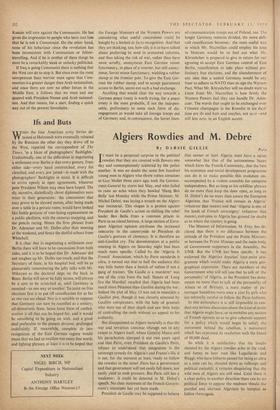Ifs and Buts
WHEN the four American army lorries de- tained at Helmstedt were eventually released by the Russians the other day they drove off to the West, reported the correspondent of The Times, 'in a blaze of photographers' flashlights.' UndoUbtedly, one of the difficulties in negotiating a settlement over Berlin is that every gesture, from either side—every hand outstretched, every fist clenched, and every jaw jutted—is made with the photographers' flashlights in mind. It is difficult to arrive openly at open agreements, whatever poor President Wilson may once have hoped. The sly, secretive, diabolically clever diplomatists were wiser in their generation: the concessions that may prove to be shrewd moves, after being made over a table in a private room, would have looked like feeble gestures of vote-losing appeasement on a public platform, with the cameras snapping, and the pencils racing. Hence the firm phrases from Dr. Adenauer and Mr. Dulles after their meeting at the weekend, and hence the dutiful echoes from Whitehall.
It is clear that in negotiating a settlement over Berlin there will have to be concessions from both sides, and it is to be hoped that Dr. Adenauer did not toughen up Mr. Dulles too much, and that the Secretary of State, in his hospital bed, will be as pleasurably remembering the jolly talks with Mr. Mikoyan as the doctoral slaps on the back in Bonn. Berlin will never be fully secure, will always be a sore to be scratched at, until Germany is reunited—in one way or another. To insist on free elections first is to put off reunification for as far as one can see ahead. Nor is it sensible to suppose that Germany can now be reunified as a unitary, all-democratic State. Some loose form of confed- eration is all that can be hoped for, and it would be something to be going on with, and a good deal preferable to the present division, prolonged indefinitely. If, meanwhile, complete de jure recognition of the East German regime would mean that we had to swallow too many fine words and fighting phrases, at least it is to be hoped that, the Foreign Ministers of the Western Powers are considering what useful concessions could be bought by a limited de facto recognition. And that they are thinking, too, how silly it is to have talked about preferring to send in armoured columns, and thus taking the risk of war, rather than have some scruffy, anonymous East Gernian minor functionary, in place of a smarter, but still anony- mous, Soviet minor functionary, wielding a rubber stamp at the frontier post. To give the East Ger- man the rubber stamp, and to accept guaranteed access to Berlin, seems not such a bad exchange.
Anything that would clear the way towards a German peace treaty is worth trying, for a peace treaty is the most probable, if not the indispen- sable, preliminary to some such form of dis- engagement as would take all foreign troops out of Germany and, in consequence, the Soviet lines- of-communication troops out of Poland, too. The longer Germany remains divided, the more diffi- cult reunification becomes: the most useful wa■ in which Mr. Macmillan could employ his time in Moscow would be to find out what Mr. Khrushchev is prepared to give in return for our agreeing to accept East German control of East Berlin, reunification to take place without pre- liminary free elections, and the abandonment of any idea that a united Germany would be any freer to adhere to NATO than to sign the Warsaw Pact. What Mr. Khrushchev will no doubt want to know from Mr. Macmillan is how firmly the Western Powers feel they can handle Dr. Aden- auer. The words that ought to be exchanged over Crimean champagne in the Kremlin in tin days' time are ifs and buts and maybes, not nyet—and still less nein, in an English accent.






































 Previous page
Previous page